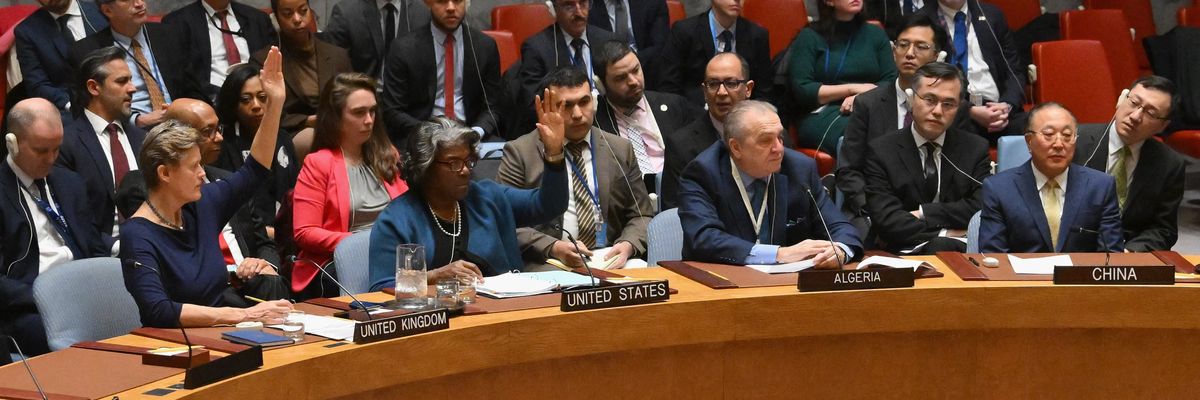Russia and China on Friday vetoed a U.S. resolution at the United Nations Security Council that called a Gaza cease-fire "imperative" but stopped short of demanding a halt to Israel's monthslong assault on the besieged enclave.
Algeria, which does not have veto power, joined Russia and China in opposing the U.S. resolution, which 11 Security Council members supported. Guyana abstained.
Friday's 11-3-1 vote came just over a month after the U.S. used its veto power to tank an Algeria-led resolution demanding "an immediate humanitarian cease-fire that must be respected by all parties."
Amar Bendjama, Algeria's ambassador to the U.N., said Friday that he was speaking not only for his country "but as a representative of the whole Arab world" as he explained their shared opposition to the U.S. resolution. Bendjama said Algeria proposed edits to the U.S. draft, but the final resolution left central concerns "unaddressed."
"We echoed the demands of millions of people and humanitarian actors for an immediate cessation of hostilities," said Bendjama. "Regrettably, the draft resolution falls short of our expectations. It fails to adequately address these main issues and the immense suffering [being endured] by the Palestinian people."
"Those who believe that the Israeli occupying power will choose to uphold its international legal obligation are mistaken," he argued. "They must abandon this fiction."
Bendjama, who cited the 32,000 people killed by Israel so far and the tens of thousands more wounded or permanently disabled, said the draft of the resolution "does not convey a clear message of peace" and "tacitly allows for continuing civilian casualties and lacks clear safeguard to prevent further escalation."
Russia's ambassador to the U.N., Vassily Nebenzia, argued the U.S. resolution was "not enough" and accused the Biden administration of "deliberately misleading the international community."
Outside analysts also criticized the U.S. resolution. Trita Parsi, executive vice president of the Quincy Institute for Responsible Statecraft, said that while the resolution is "significantly stronger" than previous U.S. drafts, "it still falls short of a clear and unequivocal demand for an unconditional cease-fire."
Craig Mokhiber, a former U.N. official who resigned in late October over the international body's failure to respond to Israel's assault on Gaza, said the U.S. measure "is not a cease-fire resolution. It is a ransom note."
Instead of clearly demanding a cease-fire, the U.S. resolution proposed more ambiguous language expressing "the imperative of an immediate and sustained cease-fire to protect civilians on all sides, allow for the delivery of essential humanitarian assistance, and alleviate humanitarian suffering."
The resolution also tied support for a cease-fire to "the release of all remaining hostages."
Parsi said in a statement Friday that "undoubtedly, Biden's rhetorical shift in favor of a ceasefire is noteworthy, but the devil is in the details."
"The unnecessarily convoluted operative clause raises concerns that this shift is less straightforward than it could and should be," Parsi added.
